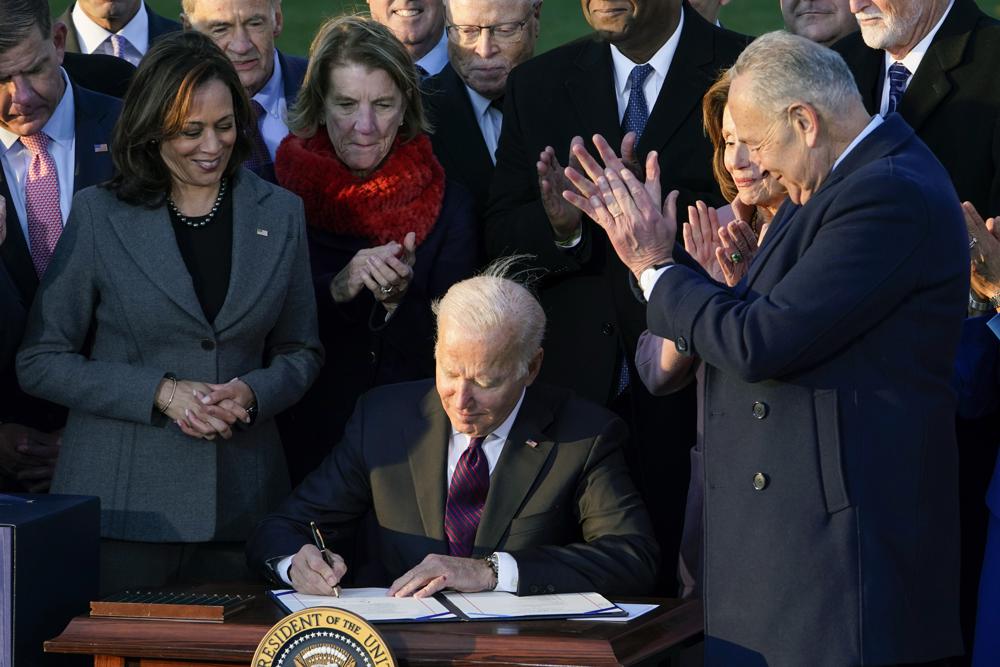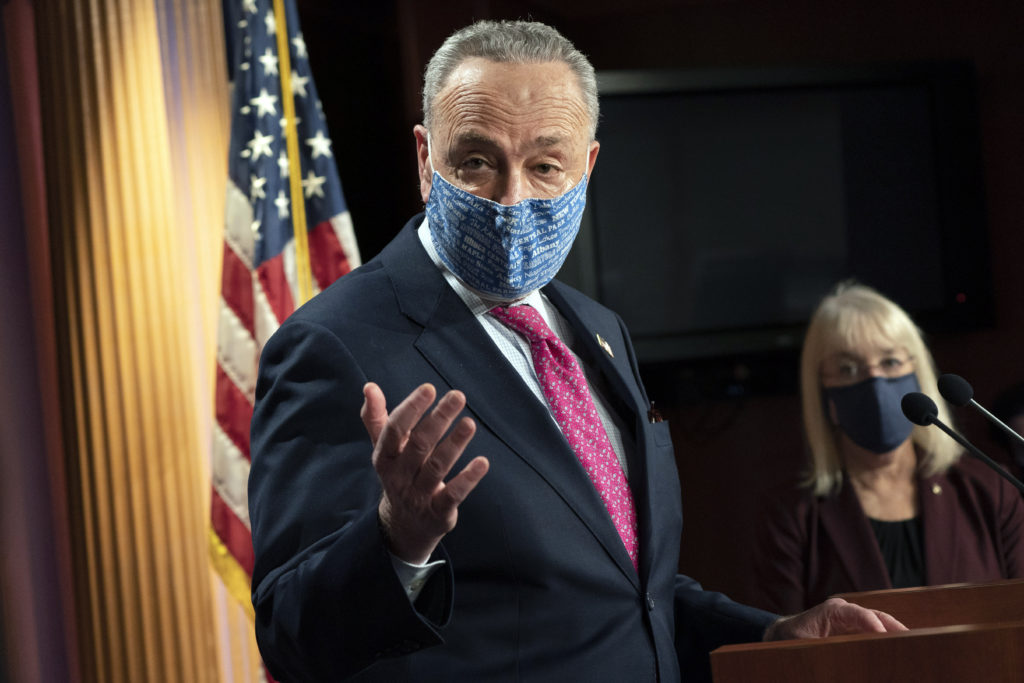Joe Biden signs $1T infrastructure deal with bipartisan crowd

President Joe Biden signed his hard-fought $1 trillion infrastructure deal into law Monday before a bipartisan, celebratory crowd on the White House lawn, declaring that the new infusion of cash for roads, bridges, ports, and more is going to make life “change for the better” for the American people. But prospects are tougher for further bipartisanship ahead of the 2022 midterm elections as Biden pivots back to more difficult negotiations over his broader $1.85 trillion social spending package. The president hopes to use the infrastructure law to build back his popularity, which has taken a hit amid rising inflation and the inability to fully shake the public health and economic risks from COVID-19. “My message to the American people is this: America is moving again and your life is going to change for the better,” he said. With the bipartisan deal, the president had to choose between his promise of fostering national unity and a commitment to transformative change. The final measure whittled down much of his initial vision for infrastructure. Yet the administration hopes to sell the new law as a success that bridged partisan divides and will elevate the country with clean drinking water, high-speed internet, and a shift away from fossil fuels. “Folks, too often in Washington, the reason we didn’t get things done is because we insisted on getting everything we want. Everything,” Biden said. “With this law, we focused on getting things done. I ran for president because the only way to move our country forward in my view was through compromise and consensus.” Biden will get outside Washington to sell the plan more broadly in the coming days. He intends to go to New Hampshire on Tuesday to visit a bridge on the state’s “red list” for repair, and he will go to Detroit on Wednesday for a stop at General Motors’ electric vehicle assembly plant, while other officials also fan out across the country. The president went to the Port of Baltimore last week to highlight how the supply chain investments from the law could limit inflation and strengthen supply chains, a key concern of voters who are dealing with higher prices. “We see this as is an opportunity because we know that the president’s agenda is quite popular,” White House press secretary Jen Psaki said Monday before the signing. The outreach to voters can move “beyond the legislative process to talk about how this is going to help them. And we’re hoping that’s going to have an impact.” Biden held off on signing the hard-fought infrastructure deal after it passed on Nov. 5 until legislators would be back from a congressional recess and could join in a splashy bipartisan event. On Sunday night before the signing, the White House announced Mitch Landrieu, the former New Orleans mayor, would help manage and coordinate the implementation of the infrastructure spending. The gathering Monday on the White House lawn was uniquely upbeat with a brass band and peppy speeches, a contrast to the drama and tensions when the fate of the package was in doubt for several months. The speakers lauded the measure for creating jobs, combating inflation, and responding to the needs of voters. Ohio Sen. Rob Portman, a Republican who helped negotiate the package, celebrated Biden’s willingness to jettison much of his initial proposal to help bring GOP lawmakers on board. Portman even credited former President Donald Trump for raising awareness about infrastructure, even though the loser of the 2020 election voiced intense opposition to the ultimate agreement. “This bipartisan support for this bill comes because it makes sense for our constituents, but the approach from the center out should be the norm, not the exception,” Portman said. The signing included governors and mayors of both parties and labor and business leaders. In addition to House Speaker Nancy Pelosi and Senate Majority Leader Chuck Schumer, the guest list included Republicans such as Louisiana Sen. Bill Cassidy, Maine Sen. Susan Collins, New York Rep. Tom Reed, Alaska Rep. Don Young, and Maryland Gov. Larry Hogan. In order to achieve a bipartisan deal, the president had to cut back his initial ambition to spend $2.3 trillion on infrastructure by more than half. The bill that becomes law on Monday in reality includes about $550 billion in new spending over 10 years, since some of the expenditures in the package were already planned. The agreement ultimately got support from 19 Senate Republicans, including Senate GOP leader Mitch McConnell. Thirteen House Republicans also voted for the infrastructure bill. An angry Trump issued a statement attacking “Old Crow” McConnell and other Republicans for cooperating on “a terrible Democrat Socialist Infrastructure Plan.” McConnell said the country “desperately needs” the new infrastructure money, but he skipped Monday’s signing ceremony, telling WHAS radio in Louisville, Kentucky, that he had “other things” to do. Historians, economists, and engineers interviewed by The Associated Press welcomed Biden’s efforts. But they stressed that $1 trillion was not nearly enough to overcome the government’s failure for decades to maintain and upgrade the country’s infrastructure. The politics essentially forced a trade-off in terms of potential impact not just on the climate but on the ability to outpace the rest of the world this century and remain the dominant economic power. “We’ve got to be sober here about what our infrastructure gap is in terms of a level of investment and go into this eyes wide open, that this is not going to solve our infrastructure problems across the nation,” said David Van Slyke, dean of the Maxwell School of Citizenship and Public Affairs at Syracuse University. Biden also tried unsuccessfully to tie the infrastructure package to the passage of a broader package of $1.85 trillion in proposed spending on families, health care, and a shift to renewable energy that could help address climate change. That measure has yet to gain sufficient support from the narrow Democratic majorities in the Senate and House. Biden continues to work to appease Democratic skeptics of the broader package such as
Democrats prep Joe Biden’s virus aid package with or without GOP

Senate Democrats are preparing to push ahead quickly on President Joe Biden’s $1.9 trillion COVID-19 relief package even if it means using procedural tools to pass the legislation on their own, leaving Republicans behind. Senate Majority Leader Chuck Schumer told senators to be ready to vote as soon as next week on a budget reconciliation package that would lay the groundwork for swift passage. Coming so soon in Biden’s administration, the action provides a first test of Republican opposition to the White House priorities as well as to the new president’s promise of a “unity” agenda. “The work must move forward, preferably with our Republican colleagues, but without them if we must,” Schumer said after a private meeting of Democratic senators. “Time is of the essence to address this crisis. We’re keeping all options open on the table.” Unwilling to wait for Republicans who argue Biden’s price tag is too high and his priorities too wide-ranging, Democrats are flexing their newfound power as they take control of the Senate alongside the House and White House. It is the first time in a decade the party has held the full sweep of power in Washington, and Democrats say they have no time to waste trying to broker compromises with Republicans that may, or may not, happen. They have watched Republicans use similar procedural tools to advance their priorities, most recently the Trump administration’s GOP tax cuts. The fast-moving events days into the new majority on Capitol Hill come as the White House continued meeting privately with groups of Republican and Democratic lawmakers in hopes of striking a bipartisan agreement. Biden’s COVID-19 aid package includes money for vaccine distribution, school reopenings, and $1,400 direct payments to households and gradually boosts the federal minimum wage to $15 an hour over five years. The next steps remain highly fluid. The bipartisan Problem Solvers Caucus of more than 50 House lawmakers had a “productive meeting and constructive conversation” Tuesday with top administration officials on the virus aid and economic recovery package, according to a statement from Rep. Josh Gottheimer, D-N.J., and Rep. Tom Reed, R-N.Y., who co-chair the group. A White House official, who spoke on condition of anonymity to discuss the virtual conversation with the caucus, said there was agreement on the scope of the challenges facing the country and the need for additional relief. Biden and other members of his team intend to continue making their case to lawmakers about the need to act with urgency. Separately, the dozen senators who emerged from a lengthy private meeting with the White House on Sunday evening are talking on their own about trying to craft a more targeted bill. The bipartisan group of senators assembled privately again Monday evening. White House press secretary Jen Psaki told reporters earlier Tuesday that Biden is still looking to negotiate on an aid package, while emphasizing that several components of the existing aid will lapse in March. “He laid out his big package, his big vision of what it should look like, and people are giving their feedback,” Psaki said. “He’s happy to have those discussions and fully expects it’s not going to look exactly the same on the other end.” Sen. Susan Collins, R-Maine, who led a bipartisan effort for the last $900 billion relief package, is working again with the senators on crafting an alternative package that she has said would be more focused on money for vaccine distribution and tailored economic assistance to the neediest Americans. Collins said Tuesday that the White House made good on its commitment to deliver a more detailed accounting of the proposed expenditure. But she said the group is still waiting for data on how much funding remains unallocated from past relief measures that, by her tally, totals a whopping $1.8 trillion still unspent. Congress has approved some $4 trillion in emergency aid since the start of the coronavirus pandemic last year, a stunning outlay and the largest rescue package in the nation’s history. Senators from both parties who joined the White House call over the weekend agreed the priority needs to be standing up the country’s faltering vaccine distribution system. With the death toll climbing, and new strains of the virus threatening more trouble ahead, ensuring vaccinations appears to be crucial to stemming the COVID-19 crisis. Several senators from both parties also said they want the $1,400 direct checks to be more targeted to those in need. They also want an accounting of what remains from previously approved aid bills. But Sen. Bernie Sanders, an independent from Vermont and the incoming Budget Committee chair, said he is already working on the budget package for next week and expanding it to include Biden’s proposal to raise the federal minimum wage to $15 an hour over five years. Raising the wage is a long-running Democratic priority that would essentially double the current $7.25 hourly wage set the last time the party was in control in the Obama administration. Advocates say the pay raise would boost millions of full-time workers from poverty. “There is a consensus,” Sanders told reporters at the Capitol. “If Republicans are not prepared to come on board, that’s fine. We’re not going to wait. We’re going forward soon and aggressively.” Republished with the permission of the Associated Press.


